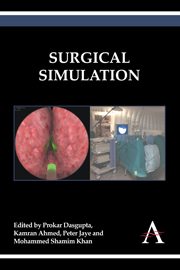Book contents
- Frontmatter
- Contents
- 1 Surgical Simulation: An Overview
- 2 Simulation in Historical Perspective: The History of Medical and Surgical Simulation
- 3 The Role of Animal Models in Surgical Training and Assessment
- 4 Full Procedural Surgical Simulation
- 5 Developing Non-technical Skills
- 6 Learning Curves for Simulators
- 7 Developing a Simulation Programme
- 8 Patient Safety and Simulation
- 9 Psychometrics
- 10 Future of Surgical Simulation
- Author Details
5 - Developing Non-technical Skills
Published online by Cambridge University Press: 05 April 2014
- Frontmatter
- Contents
- 1 Surgical Simulation: An Overview
- 2 Simulation in Historical Perspective: The History of Medical and Surgical Simulation
- 3 The Role of Animal Models in Surgical Training and Assessment
- 4 Full Procedural Surgical Simulation
- 5 Developing Non-technical Skills
- 6 Learning Curves for Simulators
- 7 Developing a Simulation Programme
- 8 Patient Safety and Simulation
- 9 Psychometrics
- 10 Future of Surgical Simulation
- Author Details
Summary
Introduction
Surgery, perhaps more than any other branch of medicine, has been defined by the technical skills of its clinicians, and this has meant that the acquisition of these skills has taken primacy over other training requirements. However, the practice of surgery contains far more than high-quality technical skills. These other skills are termed non-technical skills (NTS) and include cognitive and social skills such as decision making, situation awareness, professionalism, teamwork and communication.
There is increasing evidence that deficiencies in NTS exist in surgical teams and that this can significantly affect team performance and patient safety. Clearly current models of surgical training do not adequately ensure the development of these skills and healthcare still ‘lags unacceptably behind other safety-critical industries such as aviation’ (House of Commons Health Committee, 2009).
These NTS are not innate personality traits but can be taught and developed through training. Several authors and government bodies have called for improved training to address this skills gap and simulation has emerged as a powerful training tool to help achieve this (1, 2).
This chapter will first discuss the importance of NTS in healthcare and assuring patient safety and also highlight deficiencies of NTS in surgical practice. Secondly, training methods to improve NTS will be discussed with an emphasis on high-fidelity simulation-based training, which is being increasingly used as a tool to develop and assess these skills in healthcare.
- Type
- Chapter
- Information
- Surgical Simulation , pp. 51 - 62Publisher: Anthem PressPrint publication year: 2014



